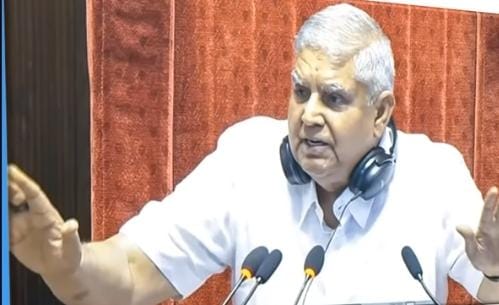

NEW DELHI: The sudden resignation of Vice President Jagdeep Dhankhar has triggered a storm within the ruling BJP, exposing deepening fissures between the Prime Minister’s camp and the RSS. While the official reasons remain unclear, it is evident that Dhankhar’s style of functioning had long irked senior BJP leaders and RSS insiders.
For months, insiders had hinted at discomfort with Dhankhar’s increasingly assertive approach as Chairman of the Rajya Sabha. His interventions and conduct during parliamentary proceedings reportedly upset not only opposition parties but also some within the NDA fold.
According to top sources in the Sangh Parivar, Dhankhar—an advocate-turned-politician from Jhunjhunu, Rajasthan—was no longer seen as an asset by the BJP brass or the Prime Minister’s inner circle.
Significantly, Dhankhar still had two years remaining in his tenure. That makes his exit more than just routine political reshuffling—-it signals serious internal recalibrations. A senior RSS functionary bluntly stated that Dhankhar had “outlived his utility” and was no longer in alignment with the evolving political strategy of the Modi-Shah leadership. The decision to replace him, however, was not easy. It required consensus across multiple power centres: the BJP leadership, the Sangh, and key NDA allies.
Adding to the intrigue, there are now reports that the NDA is contemplating a major realignment of parliamentary positions. Sources say that Harivansh Singh, the current Deputy Chairman of the Rajya Sabha and a senior JD(U) leader (now aligned with BJP), is being considered as Dhankhar’s replacement. Harivansh, a seasoned journalist-turned-politician, is viewed as someone who enjoys goodwill across party lines, and his elevation could help calm tensions in the Upper House.
In a tactical move to reinforce the NDA coalition’s longevity, the BJP is reportedly toying with the idea of offering the Deputy Chairman post to the Telugu Desam Party (TDP). With TDP chief Chandrababu Naidu returning to the NDA after a bitter split in 2019, BJP strategists believe that empowering an ally like TDP within Parliament can serve as a signal of stable coalition governance—vital ahead of the crucial Bihar elections and the 2029 Lok Sabha polls.
However, the political shake-up does not stop with Parliament. A parallel tug-of-war is reportedly playing out within the BJP itself, over the party presidency. With J.P. Nadda’s extended term is expected to end soon, Prime Minister Narendra Modi is said to favour continuity and centralised control. But the RSS is pushing back—asserting its own say over the party’s top leadership.
In this backdrop, the name of Sanjay Joshi—a long time RSS loyalist and once a key BJP organiser—has surfaced again. Joshi was side lined by Modi over a decade ago due to internal rivalry, but the Sangh still holds him in high regard. By projecting Joshi as a contender for BJP president, the RSS appears to be signalling its intent to reclaim ideological control within the party, especially at a time when electoral calculations and realpolitik dominate decision-making in the Modi camp. RSS chief Mohan Bhagwat wants to redeem his reputation by hoisting him to the highest post of the President in the BJP.
These overlapping developments suggest that Dhankhar’s resignation is only the visible tip of a larger power churn. As the BJP and the Sangh navigate a complex terrain of succession, coalition management, and internal dissent, the days ahead are likely to witness more unexpected twists.
For now, all eyes remain fixed on who enters the Rajya Sabha chair and who emerges at the helm of the BJP—each choice carrying deep consequences for the future of India’s ruling establishment.
[Writer is a Senior Journalist and Political Commentator]





